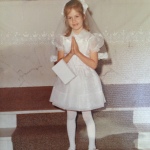Faith of Our Fathers
first communion, 1st grade
One of my great uncles had 11 children. They came to our house once, some of them having to sleep in our camper out in the driveway. At our house, when one of the five of us deserved a scolding, my mother tended to run all our names together as she yelled, too distracted to zero in on the one who was at fault. I tried to imagine what it must be like to mentally juggle 11 kids, so I asked my uncle what his kids’ names were. He got all the way to 10–twice–and could not for the life of him recall who he was leaving out. This both shocked and amused me.
In my Catholic childhood, big families were part of the scenery, as were loud, over-the-top wedding receptions, midnight mass on Christmas Eve, and sweating nervously in the confessional box. I went to parochial school for several years and wore a white blouse and blue plaid skirt with loafers every day as the nuns taught class. On a couple of occasions, I had to hold out my palm to be whacked with a ruler for talking too much. I can recite the Hail Mary, Our Father, and Grace Before Meals in my sleep. We went to mass with my father on Sundays, but my mother did not go. She had a falling out with the Church before I came along, and she spent Sunday mornings with her coffee and the crossword puzzle. I always missed her presence there, wished I could have heard her voice blending with my father’s in song.
I’ve always been a questioner. This did not always work in my favor (hence, the palm whacking). In third grade, the nun asked the class to close our eyes tightly and tell her what we saw. I said I saw blackness with bursts of flashing lights. (Try it–tell me I’m wrong.) Apparently, the correct answer was “nothing,” but I would not give in to that fiction. I knew what I’d seen and, like young George Washington, would not tell a lie. Lesson: people in positions of authority could tell you what you should believe, but they could not make you believe it. From then on, I questioned lots of things, which finally culminated in a hostile car ride on the way to mass one Sunday, when I demanded to know why I had to go. My father, at his wit’s end with my incessant questioning, gave up, pulled over, and told me I could walk back home if I couldn’t bear to endure a mere hour with God.
I stalked back home to my mother and the crossword puzzle, but he’d missed the point. It wasn’t God I was questioning. Him, I got. For me, God was personal and experienced. He was my Aibileen Clark, from The Help, whispering to me that I was kind, smart, and important, when everything else in middle school seemed to say the opposite. It was logical and reasonable to me that God was holding the world together. It was either that or Bermuda grass–an easy choice. It was the particular trappings of church I had trouble with. We read from the hymnal each week, with prescribed scriptures and songs according to what day it was. We sat, stood, and knelt as dictated. The “smells and bells” of the church were beginning to wear thin.
For the next few years, I read, studied, investigated, asked. At my father’s request, I had a Q&A with my priest, took lots of classes in college. The world of faith was a petri dish that I gazed at intently, curious to see what would appear, certain that something would. I found a more grounded, personal, rubber-meets-the-road faith in the Protestant tradition where I landed. It seemed more engaging, challenging, and best of all, encouraged questions. I watched and experienced a dynamic, alive faith in the lives of people I knew. So now I guess I have a sort of dual citizenship. When you’re raised Catholic, it’s something you carry with you, even if you’ve lapsed. It’s like being German by birth, but not walking around in lederhosen carrying a stein of beer. No one would even know by looking at you.
This past summer our family toured Israel, historically holy ground for three major world religions. There, you literally wear your faith on your sleeve. You can tell by hairstyles, dress, and language which faith someone holds, unlike in America, where we tend to hide it well. At the wailing wall, amidst dozens of orthodox Jews praying and chanting with a fervent rocking motion, I experienced a presence of the sacred so moving I wept. Walking in the historical steps of Christ, in the stone holding cells beneath the chief priest’s house, again there was a sacred awe. People at several of the Muslim sites we visited were openly hostile. There, I felt the opposite of peace, yet it was still a spiritual experience. Israel is an intensified microcosm of faith displayed in a bell jar for the world to see on the nightly news.
Despite how culturally adversarial and balkanized different faiths can be, tradition can be a useful talisman, a beacon shining on the path behind and lighting the way forward. Revisiting the church of my youth, I can appreciate a depth that I was oblivious to as a kid, squirming in the pew, and more importantly, I appreciate that others find a depth and a comfort there. I hope I have matured in many ways since that long walk home when I was banished from the car. One thing I have noticed is that much of my walk in faith has been like that moment in third grade—bursts of light in the blackness. Moments where I totally get it and feel a grateful peace, and moments where I stumble along in the dark stepping on Legos, ignoring lights along the way. I still question, seek, occasionally doubt or wonder, and encourage my kids to do the same. It warms my soul that they can hear their dad and me blending our voices in the pew on Sundays, not because we make some lyrical harmony, but because we are creating a tradition and a beacon of our own, one they can draw a peace from and build on themselves. I am grateful they know a personal Father who will always, no matter the chaos or multitudes, be able to recall their names, leaving no one out.

